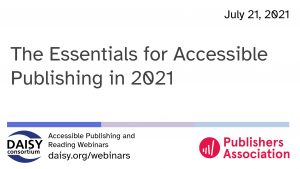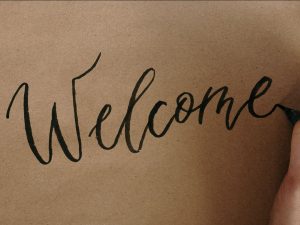The Essentials for Accessible Publishing in 2021 (W)
 In our series of free DAISY webinars July 21st saw a session focused on The Essentials for Accessible Publishing in 2021. This webinar was held in partnership with the UK Publishers Association, Accessibility Action Group (AAG) in place of their annual in person seminar at The London Book fair.
In our series of free DAISY webinars July 21st saw a session focused on The Essentials for Accessible Publishing in 2021. This webinar was held in partnership with the UK Publishers Association, Accessibility Action Group (AAG) in place of their annual in person seminar at The London Book fair.
This page contains:
Full Video of the Webinar
Speakers
- Stacy Scott (RNIB), chair of the PA Accessibility Action Group—guest host.
- Dr Agata Mrva-Montoya (Sydney University Press)
- Laura Brady (House of Anansi)
- Richard Orme (DAISY)
- Graham Bell (EDItEUR)
- Daniella Levy-Pinto (NNELS)
Session Overview
In keeping with previous AAG seminars this webinar promised to be a quick fire journey through this huge topic with lots of speakers, experts in their fields and plenty of take homes for our delegates. Stacy Scott introduced the topic and our first speaker Dr. Agata Mrva-Montoya briefly explained the areas that would be covered.
Advocacy and Policy
Agata briefly took us through the results of an insightful survey conducted in Australia this year, encouraging us to ensure that in-house advocacy is in place accompanied by a clear and thorough accessibility policy so that “publishers can produce born accessible publications themselves”. Her presentation included an extremely useful overview of how to put together an effective accessibility policy and areas that should be taken into account. Publishers shouldn’t forget that this policy together with their overall approach to accessibility requires regular review and should be cognisant of technical standards and provisions for procurement.
- Inclusive Publishing article on the Australian surveys
- Inclusive Publishing in Australia: A Preliminary Report
- Producing Accessible Books in Australia: A Snapshot
Content Workflows
Laura Brady gave us a tour of the various workflow routes to accessible EPUB, emphasising the need for culture change in-house to effect these workflow options and stressing that “buy-in throughout the chain is key to the successful production of accessible content.” Lots of useful resources and options to consider including, WordToEPUB, InDesign workflows and XML workflows (the head of the workflow food chain).
- LinkedIn Tutorial: EPUB Accessibility Using InDesign
- WordToEPUB
- Prepping an InDesign File for EPUB
- Post InDesign Remediation of EPUBs
- Ebooks from InDesign: 20 Things to Consider
Tools and Solutions
Richard Orme continued Laura’s workflow presentation with a look at post-export tools for validation and conformance checking of content. In particular he highlighted EPUBCheck, Ace by DAISY, Ace SMART, The Accessible Publishing Knowledge Base and the Inclusive Publishing hub, urging everyone to take a look at the latter and sign up for the inclusive publishing newsletter at the very least!
Accessibility Metadata
Graham Bell gave us a clear overview of why it is so important to include accessibility metadata at all stages of content production. “If you optimize the accessibility of your books, then your book metadata should reflect that.” He focused on the 3 types of metadata that should be included: metadata included in web pages, metadata included within the EPUB package and accessibility metadata about the book which is embedded in the ONIX. All three serve quite different purposes and should be considered.
- Web Schemas / Accessibility
- Schema.org
- EPUB Accessibility 1.0
- Accessibility Metadata Project
- ONIX for Books
- Metadata in Publishing: The Hidden Information Essential for Accessibility (DAISY webinar)
- Inclusive Publishing Metadata Overview
Consumer Testing and Feedback
Daniella Levy-Pinto impressed upon us the importance of testing content, using the tools that Richard spoke about and via manual testing using testers with lived experience. It is a necessary and vital part of your content workflow and must take into account the various types of assistive technology that may be used in order to access published works. “Assistive Technology provides opportunities for print disabled readers to access content and it’s important for publishers to understand this technology and to test their content with it.” Talking us through the testing process, Daniella showed us how an accessibility testing process with user feedback improves awareness and communication amongst employees, consumers and other end users.


 Richard Orme, Chief Executive Officer at The DAISY Consortium delivered the following welcome piece for the
Richard Orme, Chief Executive Officer at The DAISY Consortium delivered the following welcome piece for the